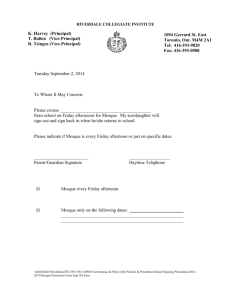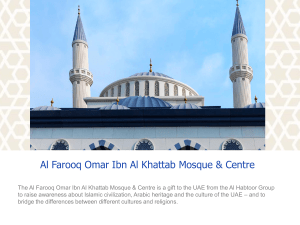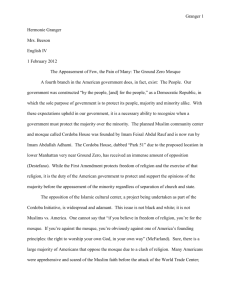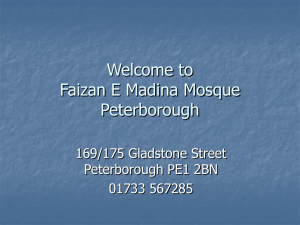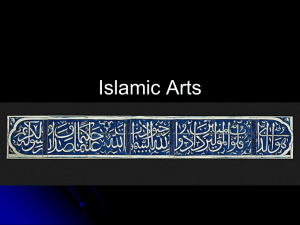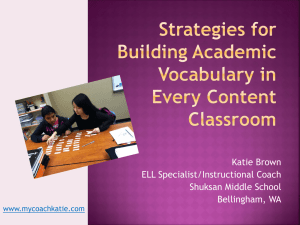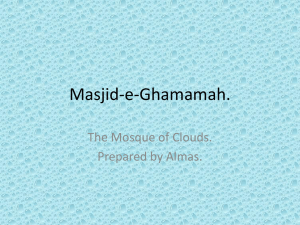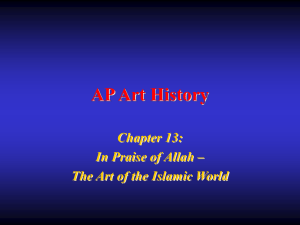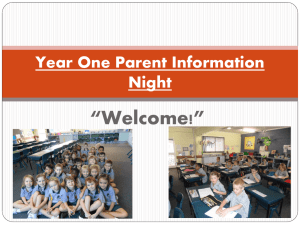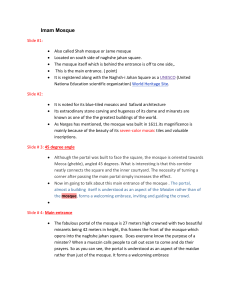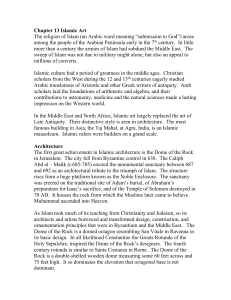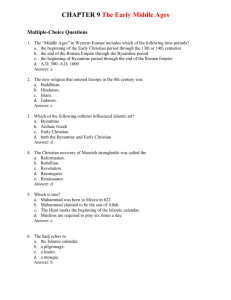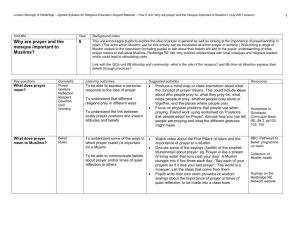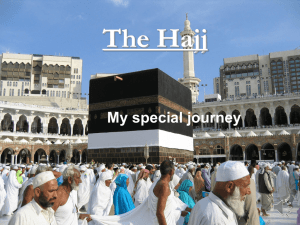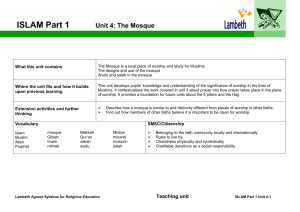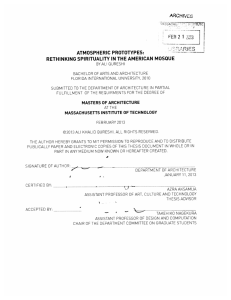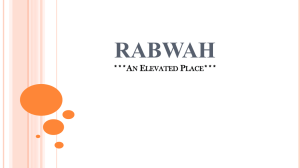The Mosque: EYFS and KS1 - lesson ideas (previous syllabus)
advertisement
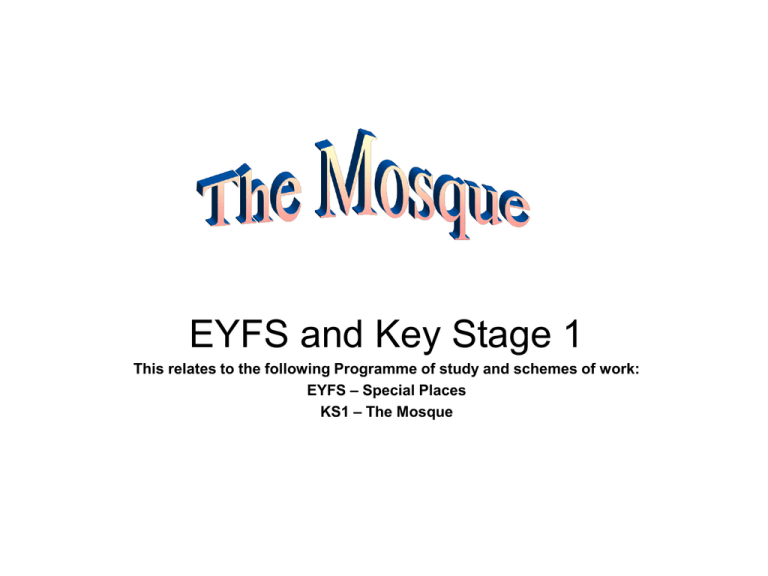
EYFS and Key Stage 1 This relates to the following Programme of study and schemes of work: EYFS – Special Places KS1 – The Mosque Skills and Attitudes Investigation, Interpretation, Synthesis, Application, Communication, Self-awareness, Respect, Open-mindedness, Appreciation & Wonder. Kinaesthetic Visit a mosque/virtual tour/Visitor Create role play into a Special place. Resource: ‘Our places of Worship’ CD Rom Wayland books Auditory Listen to Islamic music i.e. Call to prayer. Key learning Children learn about the Mosque as a special place for Muslims .They learn about its purpose and the meaning it holds for Muslims. They will reflect upon the communities to which they belong and the places that are significant to themselves and to others. Visual Photos, Islamic calligraphy. Spiritual Development Kinaesthetic Think about our own special places. Places where we like to be. Reflective areas in school/use of outside-Gardens being a special place. Junk model a Mosque Show CD Rom extract – the Mosque, prayer. Use ‘Articles of Faith’ Wooden/cloth Mosque to encourage understanding and pupil initiated learning Create own prayer mats using symmetry and calligraphy Areas of learning Mathematical understanding-the number of times the rituals are done importance of number 5 Personal developmentSkills for learning and life Responsible citizens Historical, geographical and social understanding Understanding English, communication and languages - using the gestures to communicate religious meanings. Visual • • • • Look at Mosque itself – The shapes of the building /the patterns./prayer mat pattern. Virtual tour Photographs • • Prayer beads (Subha or Tasbih)-There are 99 beads. There is 1 for each of the 99 beautiful names for God. Muslims call God Allah Looking at prayer mats- prayer mats traditionally show a mosque. \the place of prostration/archway and a lantern Silhouette paintings of Mosque shapes. What is the most beautiful name you know-why? Think about own names why they have been chosen. Art collage of own name. Explain in Islam they do not have pictorial representation so they use pattern Look at different prayer mats what part of the prayer mat do you like most? Invite children to touch mats and explain that it is a special place for a person to pray. Links back to thinking about our own special places. • • • Areas of Learning Mathematical understanding-pattern,shape. Vocabulary of direction –use of compass. Understanding the art and design-pattern, symmetry, Historical, geographical and social understanding-Muslims have to know their place and position in the Mosque. e.g. separate areas for men and women. position and direction use of compass. • Auditory • Listen to call of prayer-Think about what we hear. How the music is different to church music. This is available on ’Our Places of Worship’ CD Rom • Listening to a visitor from the Islamic community • Become familiar with the terms and vocabulary of The Mosque building-The MinaretThe tower on a Mosque where they are called to prayer. Position of prayer-Face towards Mecca. Mihrab-an interior wall indicating the direction . Minbar-Pulpit. Dome. Areas for learning • Understanding arts and design • Understanding English, communication and languages Resources • Accessing Buildings, places and artefacts. Eileen Osborne Folens ISBN 184 303 592 8 • Our Culture Muslim by Jenny Wood ISBN 0-86313-673-7 • My belief I am a Muslim by Aggarwal and Fairclough ISBN 0-7496-1404-8 • Handbook for Religious Education in the foundation Stage Solihull-prayer beads and prayer mats • www.coxhoe.durham.sch.uk> Islam Mosque >Muslim pictures >Islamic artefacts >Islam for children >Muslim • www.reonline.org • www.request.org.uk • ‘Our Places of Worship’ CD Rom Wayland books • Translation of the Adhan BBC Interactive whiteboard resource – Special places Everyday religion My Muslim life by Riadh El-Droubie ISBN 0-7502-2550-5 Creative Assessment Opportunities • Create your own special place where people will want to come to think/reflect/pray. • Make up your own call to come to this place [like the Adhan – see resources] Skills and Attitudes Investigation: • I can ask appropriate questions about what a special building is namely a Mosque. • Interpretation: I can give examples of how The Mosque is used. • Analysis and Evaluation: I can voice my opinions and give my reasons Synthesis: • I know that others share common values and ideas. Communication: • I can communicate my thoughts, ideas, beliefs & values. • • • • Self-awareness: Feeling confident about their own beliefs and identity and sharing them; developing a realistic & positive sense of their own religious, moral & spiritual ideas. Respect: Developing skills of listening and a willingness to learn from others; being sensitive to the feelings and ideas of others. Open-mindedness: Being willing to learn and gain new understanding; engaging in argument, reasonably and respectfully, about religious, moral & spiritual questions. Appreciation & Wonder: Recognizing that knowledge is bounded by mystery; appreciating the sense of wonder at the world in which they live.
